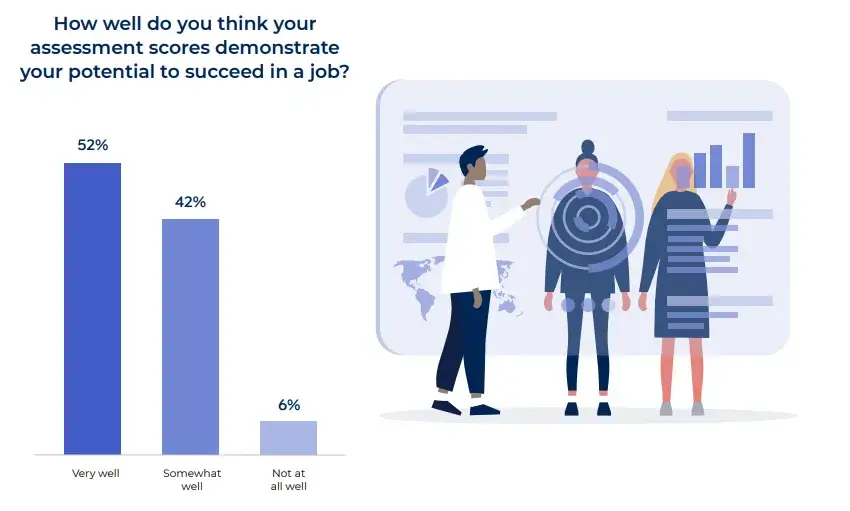Sometimes organizations are wary of including pre-employment assessments in their hiring process over concerns that they could negatively impact candidate experience. In the past, this take has been supported by anecdotal evidence: candidates voiced their frustrations with long, arduous testing that didn’t feel relevant to the job they applied for. But has the candidate sentiment changed over the years?
We decided to ask candidates about their current feelings about assessments in our 2022 Candidate Experience Report. Specifically, we wanted to know if candidates felt that assessments accurately demonstrated their abilities and potential to succeed.
What we found surprised us. Overwhelmingly, candidates see the value in assessments – 94% of respondents said they felt assessments demonstrate their potential to succeed either “very well” or “somewhat well”.

The data suggests that the notion of candidates being put off by assessments may be an outdated perception. The rise of assessments that are game-based, more engaging, shorter, and more job-relevant over the last few years have probably contributed to this change of heart. Since every candidate’s goal is to demonstrate their abilities, they likely see assessments as another avenue to impress potential employers.
In fact, many job seekers now believe that assessments help them to demonstrate their potential beyond their past experience and work history. 74% of respondents agree that assessments are a great way to highlight their full potential to employers, with 45% strongly agreeing and 29% somewhat agreeing.

Diving in a little deeper, we found that non-white candidates were more likely to strongly agree that assessments demonstrate their potential beyond their experience. Just 31% of White candidates strongly agreed with the statement. Compare this to 60% of Asian candidates, 47% of Black candidates, and 42% of Hispanic candidates who strongly agreed. This is likely because nonwhite candidates face more barriers when it comes to accessing opportunities that make for a “traditionally strong” work history. With this in mind, many diverse candidates likely view assessments as a way to prove their abilities and value to employers directly, bettering their chances of getting noticed for what really matters: their potential to succeed.
Furthermore (though unsurprisingly), younger candidates were more likely to feel that assessments capture their potential to succeed than older applicants. 53% of candidates under the age of 25 strongly agreed that assessments demonstrate their abilities beyond their past experience while only 26% of candidates 55 and over felt that way. Assessments help candidates with a shallow work history show their potential to succeed, and for these younger job seekers, assessments help them get their foot in the door in a way their resume usually can’t.
According to our survey data, the way candidates feel about assessments seems to have shifted sharply. Candidates see the value in assessments as another way to showcase their ability and potential to organizations – especially for younger and more diverse candidates. If you’re looking to expand your candidate pool and find the strongest talent among them, there’s no reason to shy away from assessments. You can include them in your hiring process with confidence, with the knowledge that assessments don’t detract from a positive candidate experience or your employer brand – in fact, they likely add to it.
Want to discover all the surprising findings from our survey? Download the 2022 Candidate Experience report today.





